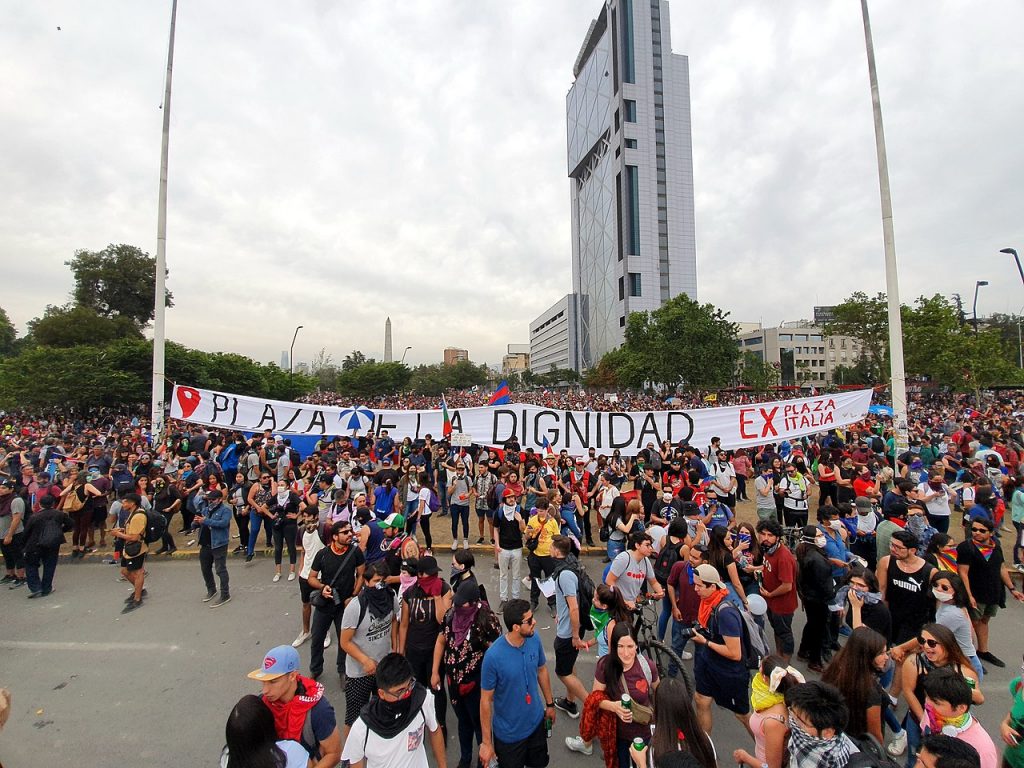By Manuel Alejandro Núñez Ochoa.
Since 2019 a series of public protests and demonstrations have swept across South America. Colombians, Chileans, Ecuadorians, Peruvians and Bolivians have taken to the streets to challenge their governments. Key among their reasons for protesting has been their anger at their states’ neoliberal economic measures. This increased dissatisfaction has put governments under pressure. In response, they have deployed a disproportionate use of violence and repression, using armed forces to prevent their states from collapsing. In an effort to seek stability and order they have also further criminalised and stigmatised migrants, accusing them of being a security threat and a source of the political unrest. In this post, I explore how Venezuelan migrants in countries throughout the region have been depicted as scapegoats for the protests and how political discourse has been used to stigmatise opponents in order to maintain power in the face of political instability.
First, South American governments affected by recent protests have constructed a political narrative holding migrants responsible for the chaos and instability, labelling them as instigators of crime and insecurity. For instance, in October 2019, many protesters took to the streets in Ecuador demonstrating against the economic measures introduced by the former president, Lenin Moreno. In response, many protestors were detained. The former Interior Minister, María Paula Romo, declared that most of them were Venezuelans.
In the same month in Chile, social mobilisation began after President Piñera announced an increase in the metro fare. Protesters demanded that the government make structural changes in privatisation policies and neoliberal measures in the economy. Amid the political instability, Piñera and the Chilean media suggested, in accordance with intelligence reports, that protests were infiltrated by Venezuelan migrants who supported the Maduro regime.

In November 2019, protests began in Bolivia after controversial results in the presidential elections. After the right-wing president Jeanine Áñez took power four Venezuelans were detained during the protests. Her interior minister Arturo Murillo claimed that they had been found with Venezuelan police uniforms and declared that: ‘We are not going to allow sedition in this country – it is not right that [Venezuelans] destabilise other countries with terror.’
In the case of Colombia, protests also began in November 2019, when many sectors of civil society mobilised to call for a national strike. The marches supported multiple petitions against measures taken by the government. Protests were suspended at the beginning of 2021 due to COVID-19 but took force again at the end of April when a tax bill was proposed that would place a heavy burden on the middle and working classes. Since then, repression from the government has dramatically increased and many human rights abuses have been committed by the armed forces. In referring to the protests in Cali on 7th May the Colombian Minister of Defence, Diego Molano, stated: ‘The information we have from intelligence is that there is a strong presence of Venezuelans. We are in the process of prosecuting those that the community has denounced and others who are responsible according to information that we have.’
Second, migration has been used by right-wing governments in the region as an ideological tool to seek electoral support. They have spread the fear of socialist expansion from Venezuela, under the leadership of President Nicolás Maduro, by casting Venezuelan migrants as a threat to the promise of order, control, economic prosperity and security. In so doing they have discredited the protestors’ demands for change. For instance, in May 2021, the former Ecuadorian president, Lenin Moreno, declared in an interview that ‘Our intelligence system has detected political and economic interference by Maduro in Colombia’. A sector of the Venezuelan diaspora close to the right-wing in Latin America has supported these ideas of intervention, while the presumed infiltrators of the Maduro regime have been publicly cast out from different countries in the region. Those foreigners who are in favour of the elected governments are welcome and have not been criticised, ostracised or sanctioned.
Third, this narrative has justified the adoption of arbitrary and discretionary measures against Venezuelan migrants. In Bolivia, Chile and Colombia, Venezuelans have been deported and held responsible for looting, robbing and vandalism during the protests of 2019. For instance, in the most recent protests in April 2021, six Venezuelans presumed to be linked with acts of vandalism were expelled from Colombia in an express procedure in order to avoid pressure from human rights organisations. Similarly, the Colombian government did not guarantee due process – such as the presumption of innocence – to migrants who were expelled during the protests in November 2019.
This contradicts the Colombian government’s ratification of both the 1966 International Covenant on Civil and Political Rights and the 1969 American Convention on Human Rights. The Colombian Migration authorities restricted these rights in 2015 under an article in Decree 1067 – the law that regulates migration in the country. The article refers to ‘Other causes of expulsion’ that allow the Migration Authorities to expel foreigners under discretionary criteria, which include risks to ‘public order, social tranquillity and national security’. Appeals against expulsion on these grounds are not permitted. This criminalising discourse by the Colombian government has led to a growing risk of xenophobia towards Venezuelan migrants in the country and their segregation from the rest of society.
To conclude, right-wing politicians in South America have employed a particular rhetoric regarding migration in recent years that supports their electoral and political agenda. Since public protests undermine governments, politicians in power have claimed that Venezuelan migrants are behind the popular demonstrations since 2019. These governments have gone on to demonstrate control and to gain popularity by expelling thousands of Venezuelan migrants on the basis of their supposed threat to public order and security. This misleading discourse by the state has led to growing anti-migrant sentiment in the host communities.

